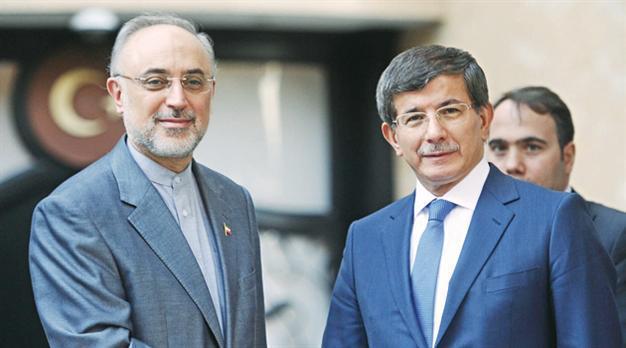Turkey, Iran friction deepening on Syria
ANKARA / TEHRAN

Visiting Iranian FM Salehi (L) holds intense talks with Turkey’s Davutoğlu.
Political tensions between Ankara and Tehran are growing over the conflict in Syria, with Turkey warning Iran to cease blaming Ankara for the Arab republic’s violence while also calling on the Islamic republic to stand against Damascus’ alleged killings.Recent remarks by Iranian officials could “harm not only the rooted relations of Iran and Turkey, but the diplomacy Iran conducts in the international arena,” Foreign Minister Ahmet Davutoğlu told reporters yesterday before departing for a visit to Myanmar.
His statement came one day after holding talks with Iranian Foreign Minister Ali Akbar Salehi, to whom Davutoğlu conveyed Ankara’s unease over Iranian Chief of Staff Gen. Hassan Firouzabadi’s suggestion that Turkey was involved in the bloodshed in Syria and accusation that Ankara, along with Saudi Arabia and Qatar, was assisting the “war-waging goals of America.”
The Iranian general’s comments had come as Salehi flew to Turkey on Aug. 7 to solicit Turkish help to effect the release of 48 Iranian pilgrims kidnapped in Syria over the weekend.
Although the comments were not made by Iran’s leaders, they were made by individuals holding official posts, Davutoğlu said. “We would expect these officials, both in Turkey and Iran, to think a few times before making any comments. Our position on the issue was explained to Mr. Salehi in a frank and friendly manner,” Davutoğlu said.
“The Syrian regime bears the whole responsibility” for the tension between Iran and Turkey, Davutoğlu said, adding that Tehran should not try to pin responsibility for Syria’s violence on other countries. “It is our right to expect Iran to assume a constructive attitude in the face of Muslim blood being spilled in Syria during the holy month of Ramadan.”
Turkish Prime Minister Recep Tayyip Erdoğan also issued a warning after Firouzabadi’s statement, saying it was “worrying and regrettable” while reminding Iran that Turkey had supported it in the international arena with regard to its ongoing nuclear program.
“When no one else was by its side, Turkey was the country that stood by Iran in spite of everything. Turkey was also the country that defended [Iran’s right to] nuclear energy,” Erdoğan said, addressing members of his party at a fast-breaking iftar dinner Aug. 7.
Salehi, meanwhile, said that although Turkey and Iran had different views on some issues, Iran’s government wanted to promote relations with Ankara.
The differences between the two countries are not having a negative impact on relations, Salehi told Iranian state TV channel IRINN on Aug. 8 while asking some Iranian officials to consider different aspects of the issue in the interests of maintaining an environment of international friendship.
Ultimately, political issues are different from humanitarian issues, Davutoğlu said, noting that Turkey was making efforts toward the release of the abducted Iranian pilgrims in Syria.
Salehi also said some “retired” members of Iran’s Revolutionary Guards and army were among the 48 Iranians taken hostage in Syria by rebels over the weekend. The foreign minister, however, denied rebels’ allegations that the Iranians had been on a military mission, saying the former military personnel had been exclusively on a religious pilgrimage to Damascus when they were seized Aug. 4.
“A number of the [hostages] are retired members of the guards and the army. Some others were from other ministries,” Salehi was quoted as saying to reporters as he flew back from Turkey.
















